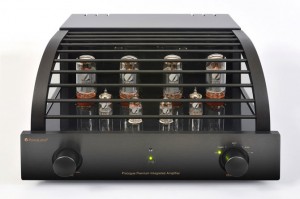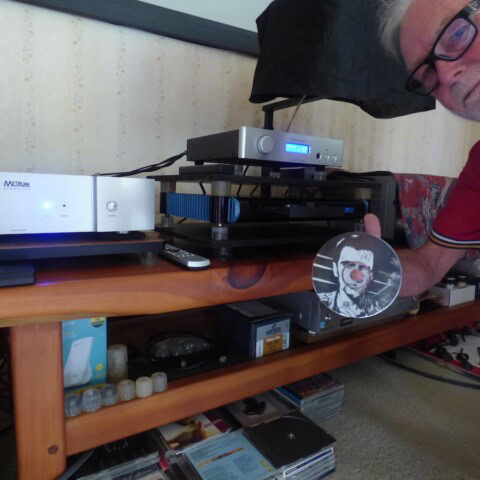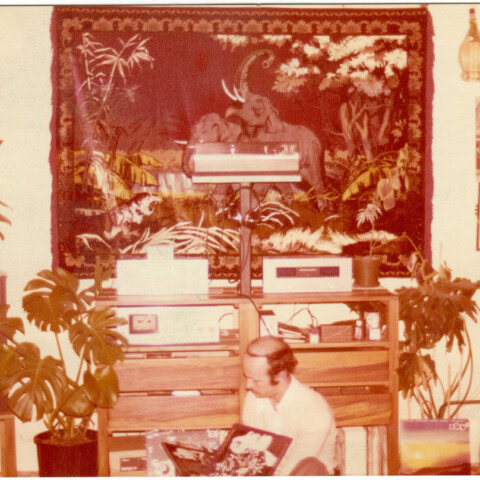Gary Steel compares the characteristics and functionality of four preamps, and comes to some surprising conclusions.
BACK IN DECEMBER 2011, it suddenly occurred to me that I was feeling starved of music. Despite the sonic revelations that a pair of Martin Logan floor-standers had brought to my life in October 2010, I spent less time listening to music in 2011 than any other year of my life, except for those formative years when I was too young to own a stereo.
It got me thinking. Sure, it had been a busy year, and as I enter the ragged glory of my middle years, I’m not so keen to listen while I work, either. But something else was turning me off. Occasionally, I would sit in the sweet spot and find my ears on a sonic Garden of Eden, but more often, I felt like my sinuses were being scraped with a very sharp surgical instrument. It’s true that when I’m on edge, or have had too many coffees, that music does take on a sharp edge. It’s also true that so many CDs (both contemporary and “classic rock”) are compressed to buggery, or “remastered” (that is, set to LOUD) in such a way as to make listening to them extremely tiring.
But I came to the conclusion that my hi-fi was accentuating these sonic nasties, adding a layer of sharp, digital glare that so often made listening at anything but the lowest volumes uncomfortable.
So… In December, I entered the learned portal of the Witchdoctor forum and asked if anyone had advice on a preamp that might make listening a more pleasurable, more sensuous, less tiring experience; a preamp that didn’t hide the deficiencies of those less sonically satisfying albums, and didn’t dress them up, but made them more tolerable.
Offers came flooding in, and a few of them I accepted. International Dynamics offered their PrimaLuna ProLogue Premium (valve) Preamp, while SoulToSoul Audio provided me with the nicely priced Yarland PM7 tube preamp. Witchdoctor guru Ashley Kramer, “on holiday” in South Africa getting his root canal fixed and sorting out his wife-to-be, generously lent me his highly unusual Stereo Knight passive preamp, and these would go up against my current preamp, a Rotel RC-1550.
Luckily, I had these to play with over the Christmas/New Year break, and even more luckily, the cicadas were slow to start inflicting their tinnitus-inducing love calls this Summer (probably due to the lack of a real Summer!), so all the right conditions for relaxed auditioning conditions were met.
I listened to a variety of discs on all the preamps, but for the test, I selected six CDs with differing sound palettes, and then got the wife – who isn’t a hi-fi nut but has a fine set of ears – to join me for the listening sessions. The songs were these:
1) Holly Cole’s version of The Beach Boys’ ‘God Only Knows’ (from her Shade album), which (like all of Cole’s albums) is incredibly recorded and engineered, and brings out both the richness and detail of the acoustic jazz-based performances.
2) International Observer’s ‘Vale’ from their Seen album. This is former Thompson Twins man Tom Bailey’s 2001 introspective electronic-dub album, which is incredibly detailed and precise in terms of imaging.
3) Madonna’s ‘Forbidden Love’ (from Confessions On A Dancefloor), a fat, pumping, sizzling dance tune with a strident vocal. [This was the wife’s choice.]
4) King Crimson’s ‘Epitaph’ from the group’s 1969 album, In The Court Of The Crimson King. Recently remastered by Porcupine Tree’s Steven Wilson, it combines acoustic elements (guitar picking) with surging mellotrons.
5) The Doors’ ‘The WASP (Texas Radio And The Big Beat)’ from LA Woman. A fairly rough recording by the group’s standards, it was remastered for the 40th anniversary in 2006, and sounds detailed and captures both Morrison’s gruff proto-rap/poem and also the bass-heavy groove, but is almost too crisp. [Note: this album has just been reissued AGAIN, but we haven’t compared it to the 2006 remaster at time of writing.]
6) Janet Jackson’s ‘Discipline’, a very naughty song from the album of the same name from 2008, which features incredible detail, but also superior booty-bass groove. Probably the kind of record the typical Witchdoctor reader would sneer at, but hey, I don’t care.
PrimaLuna – The first and last thing we notice is that with the ProLogue Premium, music drenches the whole space. That is, the sound field becomes really wide, really deep, with no crimping in the height department either. It catches the gorgeousness of the Holly Cole track, with particular emphasis on the aged woody bass and the general ambience, and her voice sounds rich and creamy. International Observer is missing a bit of the bass depth I’m used to hearing through the Rotel, but otherwise was spectacular: very smooth, incredible detail, and the intentional “out of phase” moments were head spinning.

It also had Madonna really coming alive, bringing real dynamics and swing to the disco groove, and rendering her voice bearable. One thing about the ProLogue Premium is there’s nothing particularly mellow, despite the valves. The mellotron on the King Crimson track is naturally harsh, and that’s the way it plays, but the preamp captures the richness and the incredible surging dynamic of the track. On The Doors’ track, however, the guitar hits a particularly niggling trebly part of the sound spectrum, and detracts from what otherwise sounds great. Perhaps most surprising was how it rendered the Janet Jackson disc, making even this sizzling slow booty groove musical, while still allowing a good wallop of bass heft to show itself.
Yarland – Unfortunately, the PrimaLuna would prove a tough act to follow. It emphasised the bass in the Holly Cole track, and made it very “nice”, but there detail and texture was noticeably absent, and, as the wife noted, somehow “it’s lost its balance.” With International Observer, the bass was once again more emphasised, but neither the detail nor the song’s dynamics were as well articulated. Again, with the Madonna track, there was a sense of “something missing,” which was reiterated by the King Crimson song where it was almost as if a layer of the piece had been surreptitiously extracted. The bass felt clunkier, and that was to the detriment of the overall sound, with its precise mix of acoustic and electric elements.

However, there’s one thing the Yarland does really well: there’s a section of the mid-range that just sounds more emotive, and it’s the same sonic area that displayed the echoed decay of the guitars in a way that no other preamp in this little exercise did. The Doors was a little less harsh, but came with a sacrifice: less dynamic, less BIG, less detail. Janet Jackson? The bass felt boxy, and overall, the track failed to convince.
Stereo Knight – Ashley’s magic box, which he imported from the parent company in the US, rendered Holly Cole with incredible detail. If only detail was everything, we’d be onto a winner here. International Observer’s bass simply crawled into a crack in the furniture and disappeared. Madonna sounded clinical, metallic, nasal. King Crimson sounded small, completely losing its vastness. Jim Morrison’s voice sounded great on The Doors’ track. Janet Jackson was somehow underwhelming.

With the Stereo Knight, it’s hard to put your finger on what it’s not doing right, but listening to the music through it just lacks that x-factor, that magic we’re all hoping will intoxicate us. The detail is there, but the overall image is reduced. Importantly, the width and height of the sound stage is just not there, and neither is the depth. But… but… The Stereo Knight may be the best preamp in this test. Because it’s genuinely passive, and doesn’t require any power, then it should be doing what the ultimate preamp would do: become merely an empty vessel through which the sources flow to the speakers. Reading between the lines, it may be revealing the limitations of my setup, and that’s worrying.
Oh, did I mention my setup? My pride and joy is a Yamaha CD-S2000, which feeds my Martin Logan Purity floor standers. The complicating factor is that the ML’s are powered speakers: each speaker has its own 200-watt “high resolution switching amplifier”. These can’t be bypassed – while it is possible to wire up an extra amp, one presumes it would be coloured by the amps in the speakers. Those amps, of course, must be connected to a preamp via a pair of very long RCA leads.
If the Stereo Knight is as much of a magic machine as Mr Kramer maintains, then it looks like I’m in trouble, and that it is simply exposing my power amps for what they are. But don’t forget, the Martin Logans do sound incredible when paired with great-sounding recordings.
Rotel – When all was said and done, I switched my humble Rotel back on and took that for a spin on the same six CDs. It sounded fine. Holly Cole sounded smoother, and her voice sounded breathier. International Observer sounded less spectacular than with the PrimaLuna, but somehow more perfectly integrated, and with more bass heft. King Crimson also sounded less immense and slightly less dynamic than with the PrimaLuna, but the spread of sound and the layering was really grand. The Doors’ didn’t sound as volatile/exciting as the PrimaLuna, but not bad, at all, while Janet Jackson sounded incredible.
For sound alone, the PrimaLuna ProLogue Premium was the winner of this play-off. There’s something wonderfully dynamic and spatial about this preamp, but nothing soft or flabby: it really knows how to make a rhythm section swing, and I couldn’t see any great deficiencies, apart from its slight reticence on the real bottom end of the bass spectrum.
Surprisingly, however, my second choice would be the Rotel I already own. It’s smooth, easy to listen to and well integrated. It’s just that it does and can sound sharp on horribly recorded discs… as can the PrimaLuna.
Stereophiles seem to be commonly opting for big, solid state power amps and valve amps to take off that digital glare and give it that bit of dynamic and musicality that digital amps seem to find lacking. In my situation, however, valves have a few real disadvantages. I like to listen to music in my breaks from hacking away at my computer, for periods of as little as 15 minutes to as much as an hour at a time. This means it’s more practical to leave the stereo switched on. With valve preamps (or amps) you’re aware that those valves degrade with every passing hour, so it’s best to only switch them on when you’re planning to listen to music; but to let them warm up for 10 or 15 minutes. For me, that’s a pain in the butt.
For anyone wanting a really stunning valve preamp, I wouldn’t hesitate at recommending the PrimaLuna. Its idiosyncratic design will appeal immensely to some, while to others it will look like a weird black bread basket with glowing orbs inside. It certainly proved difficult to house on my rack simply because of its height, which meant I had to relegate my turntable to storage for a month. Personally, I loved it, mainly because (apart from its great sound) of its build. The PrimaLuna isn’t just heavy, it’s clearly built with care and attention to every detail, and has convenient features built in, like lights that come on when a valve needs replacing. That’s just one of the things they’ve come up with to make this ancient technology easier to live with and maintain. As for that sound, the PrimaLuna doesn’t have that signature mellow valve sound at all. If there’s something sharp-sounding on the recording, it will allow that sharp-sound in all its glory (or otherwise). But it does somehow make the sharpness that much more tolerable, and I think part of that is that overall, it’s more dynamic and natural-sounding to the human ear (as opposed to a graph).
PrimaLuna is a Dutch company that clearly wants to bring valve gear into the 21st Century, while keeping perhaps a degree of the snob value of such gear in its idiosyncratic design and superior quality, every step of the way.
Yarland, on the other hand, is a Chinese company whose gear can be described as “budget” by comparison, and it although the build quality is fine, it doesn’t measure up to PrimaLuna’s fine standards. The PrimaLuna, for instance, features a light that switches from red to green when it’s warmed up and ready to use. The Yarland is more basic. It puts a noticeable burst of sound through the speakers when switched on (even with the volume switch down) and there’s a detectable hiss that will worry some more than others. The apparently real woodgrain fascia (which I thought was painted) looked cheap to my eyes, but I kind of liked its ugly ducking status, and it’s certainly heavy, while less imposing than the PrimaLuna, and about half as wide. Both have easy to use remotes defined by their simplicity (basically just volume controls) although the PrimaLuna volume was easier to manipulate at reduced gradients, while it was hard to get the volume ‘just right’ on the Yarland.
I should add, however, that while the Yarland’s bass sounded a bit boxy on my system, and lacked the integration of sound I was hankering for, someone else might find that it sounds fantastic on their system, and until I did a direct comparison with the PrimaLuna, I thought it sounded pretty good. And it does, it really does… just not as good.

Back to square one, then. The inconvenience of tube preamps in my situation means I’ll probably hold on to my Rotel for now, while slowly searching for a preamp that will put it to shame. Perhaps it’s time to try something by one of our fine local manufacturers? GARY STEEL
Note: There’s much I could have added to this assessment, including information about the inputs and – an important one, this – the fact that valve preamps are upgradeable, in the sense that you can switch the valves and potentially overhaul the sound. So… nothing is set in stone or definitive!
PrimaLuna ProLogue Premium $2995
www.internationaldynamics.co.nz
Yarland $1499
www.soultosoleaudio.com
Stereo Knight Magnetic Passive Preamp: Silverstone-Balance
[contact for price]
www.stereoknight.com
Rotel $1299
www.internationaldynamics.co.nz
















why does the holly cole track have that stupid japanimation video ?
Because it’s the only one that could be found – if you source another, better one, please let us know!
Timely article this one Gary. I’ll be looking for a pre-amp to match up with my RB1070 sometime this year. Thanks, Craig.
heatwave/god only knows live – from 3:21
http://www.youtube.com/watch?v=zTs90FXUUWU